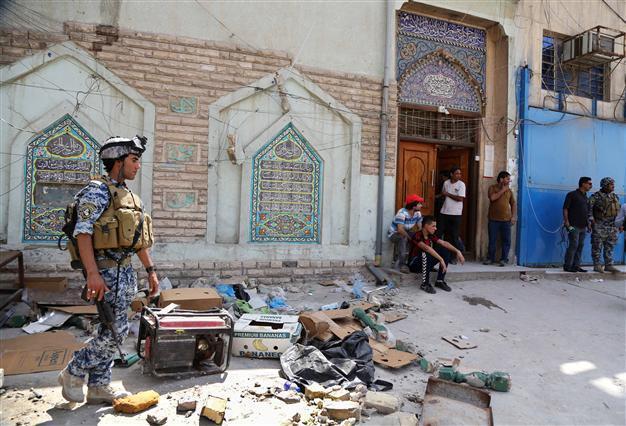Iraq attacks, including Shiite mosque bombing, kill 27
BAGHDAD - Agence France Presse

Iraqi security forces and civilians inspect the site of a suicide attack at a mosque in the Shorja market area in downtown Baghdad, Iraq, Tuesday, May 27, 2014. AP Photo
A wave of attacks in Iraq, including a suicide bombing at a Shiite mosque in Baghdad, killed 27 people Tuesday, the latest in a protracted surge in bloodshed.In the deadliest attack, a suicide bomber blew himself up at the entrance to a Shiite mosque in central Baghdad's Shorja neighbourhood as worshippers were performing ablutions ahead of mid-day prayers.
At least 19 people were killed and 34 wounded in the blast at the Abu al-Timan Husseiniyah, near the headquarters of the Baghdad mayoralty, security and medical officials said.
Security forces barred journalists from taking photographs or videos of the aftermath of the scene, a common occurrence in the wake of deadly violence in the capital.
No group immediately claimed responsibility for the bombing, but Sunni militants including those linked to the powerful Islamic State of Iraq and the Levant jihadist group often target Iraq's Shiite majority, whom they regard as apostates.
Elsewhere in the capital, roadside bombs in the neighbourhoods of Sadr City and Dura left two people dead.
And a series of shootings and bombings in the main northern city of Mosul killed six others.
Mosul and surrounding Nineveh province are among the most violent parts of Iraq, and security officials say Sunni militant groups including ISIL hold significant sway there.
Tuesday's incidents pushed the death toll for the year above 4,000 as near-daily violence and battles with militants in western Iraq have fuelled fears the country is slipping back into the all-out conflict that plagued it in 2006 and 2007.
Violence has surged in the past year to its highest level since 2008, while anti-government fighters also control an entire city a short drive from Baghdad and parts of another.
The authorities have trumpeted security operations against militants, but attacks have continued unabated on a daily basis across Baghdad and much of the north and the west of the country.
The authorities blame external factors such as the civil war in neighbouring Syria, but diplomats and analysts say the Shiite-led government must also do more to reach out to disgruntled minority Sunnis in order to undermine support for militancy.
The government has made some concessions aimed at placating the Sunni Arab minority, which alleges mistreatment at the hands of the authorities and security forces, analysts say more has to be done to address their concerns.
















